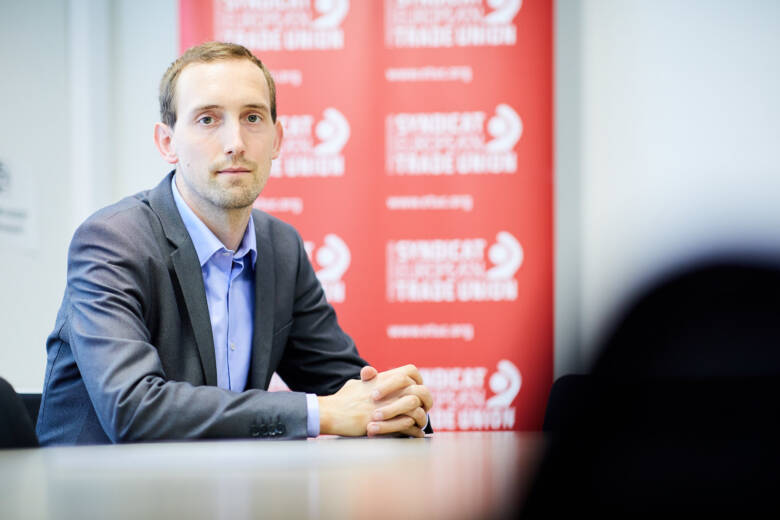
“Europe’s workers deserve a fair deal; that’s why we need to fight austerity”
NewsWhen people talk about austerity, they mean very different things. One textbook definition would be difficult economic conditions created by government measures to reduce public expenditure, but it includes so much more. ETUC’s Confederal Secretary Ludovic Voet discusses in this interview what is needed to stop Austerity 2.0. and how we, together, can build a worker-friendly future in Europe.
“Europe was only recovering from the past decade of austerity, and labor markets were still in recovery, when the Covid 19 crisis disrupted the economies in Europe”, Ludovic Voet describes the situation in 2021.
The Russian invasion of Ukraine and the cost-of-living-crisis put a lot of strain on the EU economy, but also on workers in Europe. While energy prices were escalating, many companies decided to speculate to increase profit margins. These profit margins came out of the pockets of working people. Though a small recovery in the economy can be detected, there is a real wage decline.
“The wage indexation, wage negotiations, and wage increase in Europe are all under inflation, meaning that we are all poorer in a sense. Some less than others”, Voet says.
Some EU countries have been able to mitigate this with collective bargaining and automatic indexation. But not enough.
“There are working people in very precarious situations earning less than minimum wages and having significant difficulties making ends meet. This is the reality of many Europeans today”.
Transitions revolutionizing work life
Voet acknowledges the fears that workers have about the future and the big changes lying ahead as Europe engages in a twin transition ˗ a digital and a green transformation of the economies.
“Current policies do not secure people in a way that they should, and policies are not built on the consent of people. This is particularly true for the green transition, which will revolutionize working life”, he says.
Workers have lost their jobs decades earlier but now they also witness companies struggling due to the high energy prices in Europe. According to Voet it is important to reindustrialize Europe and have an active vision for Europe. It is as a matter of survival, which will require huge engagement from the trade unions’ side.
“The uncertainty workers experience and whether they will be out of work in certain sectors is tangible. That is why companies need to invest in reskilling and upskilling and creation of new quality jobs”.
When climate policies are put in place with a price signal approach, it’s not unproblematic. If someone is faced with the cost-of-living crisis, the price signal could affect that person a lot. They would not be able to consume, to travel nor continue to drive to work.
Voet mentions the example of making for instance electric cars, heat pumps or solar panels obligatory. How do workers finance this? To finance the decarbonization of heating and transport costs in Belgium, it would require 70.000 euros and on top of that you still need to pay interest rate if you have a bank loan. Most workers could not afford this.
“So, when looking at future climate policies, we also have to ensure investments and investments on the people working in the sectors affected”, he says.
If workers are not involved in these future big decisions, there is the danger of growing lack of trust.
Combating austerity through political demands
The ETUC has a strong role in building not only a Social Europe but also a sustainable, worker-friendly Europe. Less than two weeks ago the trade union movement presented its Manifesto with 12 commitments for the upcoming EU elections.
“To gain worker’s support we cannot take their support for political parties for granted. We see this in every country where the extreme right and anti-democratic forces are on the rise, and where these anti-worker forces capitalize on the fear of workers. In a situation like this, the ETUC feel that progressive political parties must lead a campaign on the world of work”, Voet says.
He points out that workers are interested in answers on how decision-makers can secure their jobs and their income.
“That is why we need political parties and politicians to commit to the 12 commitments the ETUC is proposing putting Social Europe back on track”.
He continues:
“A lot of money is allocated to support companies in decarbonization or digitalization, but this money has no social conditionality. In public procurement we could increase social conditionality, meaning respect for companies that offer good wages and proper working conditions to their workers, collective bargaining, and human rights in their supply chains”.
Since the Covid 19 crisis, EU has had a more progressive political agenda, but Voet feels that we are now stepping backwards into a situation with more company driven policies. This means less rules for companies, but also less capacity to enforce worker’s rights or environmental protection.
“We need political parties to support progressive policies and put things into place, not only in time of crises, but also to avoid new ones”, he says referring to the demands of the movement.
“Otherwise, we might see a new wave of austerity measures in Europe”, Voet sums up.
Economic reform a key factor
Ludovic Voet’s biggest fear is that Europe will not be able to policy wise protect workers and their income nor working conditions at some point. A worst-case scenario would be an increase of inequalities. Since the beginning of the cost-of-living-crisis, lots of money has gone to excess profit, which is almost not taxed and therefore it doesn’t exist to finance social policies or for other investment purposes.
In simple terms, this does not deliver for workers. At the same time there are national budgets subject to economic rules, introducing a come-back of austerity.
“The EU Finance Ministers are discussing the reform of economic rules that would affect all the Member States with budget deficits and debt”, Voet mentions.
The current rules, which limit member state budget deficits to 3% of GDP and debt to 60% of GDP, have been suspended since 2020 to deal with economic consequences of the pandemic. The suspension will end in 2024.
“Especially Member States with a deficit above 3% will have to make a minimum fiscal adjustment of maybe 1% of GDP per year. There are quite many countries that would have to make spending cuts in the coming years”, he adds.

What EU needs to do is to ensure that member states can guarantee sufficient investments and current spending.
Another big question, also requiring investments, is the objectives of member states to limit global warming to 1.5°C – as called for in the Paris Agreement – emissions need to be reduced by 45% by 2030 and reach net zero by 2050.
“Now there are only four EU countries with fiscal capacities to make the investments for these climate targets. In countries that would like to engage in a transition, there is the risk that there could be a tradeoff between climate investments and social investments. This would have concrete consequences on the support of workers and citizens”, he reflects.
To decarbonize economies, we risk be faced with cut workers’ pension rights (increase of retirement age), cuts in social security and no wage increase. Voet points out that public support for climate policies depends on whether they are social.
The risk for austerity grows by the rise of the far-right
The Confederal Secretary also expresses his concern for the current political status in Europe, where far-right parties have gained more voters and political power. The latest news arrived only a few days ago, when we learned that another far-right government is under negotiations in the Netherlands.
And then we have Spain, where the people voted for a progressive party instead of the far-right in the national elections. According to Voet, Spain is a good example of a progressive government that has worked with trade unions, that has increased Minimum Wages and that has acted against inflation and introduced a price cap on energy.
“Introducing progressive policies is the right way forward, also to keep voters’ support”, he says.
“If you do not deliver on progressive policies, the far-right will amplify their voices”, he adds.
In the Manifesto for the 2024 elections, the ETUC withdraws from any cooperation with far-right parties in the European institutions. ETUC also points out that the far-right dishonestly claims to support working people when it attacks trade unions and workers’ democratic rights.
We have also witnessed the attack on workers’ rights and the right to strike as part of the far-right’s political agenda in Finland, where the The Finns Party are in government.
“The risk for austerity grows, not only the extreme right, but also with strong conservative governments that will put in place austerity measures. Conservative austerity will further accelerate tension in society”.
He refers to the narrative the far-right parties often use before the elections opposing austerity, but when in power the same parties impose rules on austerity decreasing workers’ rights, social and migrant rights among others.
A vote for Social Europe
The big questions remain. How can we increase a vote for the progressive parties (S&D, The Left, The Greens) in the EU elections next summer?
“Well, ETUC is of course independent from political parties but if political parties want to convince union members to vote, first you need to get people to vote, as there is a disillusion about the EU elections. Workers need to see that EU politics deliver initiatives that are positive for them and that they can benefit from the results, such as implementing minimum wages. That will increase trust in EU decision-making”.
When looking back at this mandate period, there are major EU legislations worth mentioning such as the directive on Minimum Wages and the Pay Transparency Directive. Voet also adds to the list the Directive on improving Working Conditions in Platform Work and the Directive on Due Diligence, which both are in the final trialogue stage.
“Convincing people and young people to vote is crucial. That requires a vision of Europe, that is not detached from people’s reality, but focus on ordinary issues such as people’s working life, family life and social aspects. This is something that is often absent from the political debate”, Voet points out.
“The best way to strengthen workers’ voices is for trade unions to organize. This is the only way to enforce progressive policies, collective bargaining, and a social legislation”, he adds.

Ludovic Voet, who was elected Confederal Secretary for the ETUC earlier this year, participated in the Paris demonstration in October.
Join the demonstration in Brussels 12/12/2023!
Trade unions have shown that by organizing, demonstrating, and striking, they have been able to enforce laws that still apply to protect worker’s rights. Even more recent climate demonstrations led by NGO’s, often supported by trade unions, have shown that it is the way to put issues on the agenda.
“We also need to show that people are not happy with the current way and people are demanding more. Important decisions cannot be made without listening to workers”, says Ludovic Voet, ETUC Confederal Secretary.
Demonstrations are needed to show the support to the demands of trade unions. Demonstrations are not out of date, as we have a date, which is 12th of December. Join the event!
Text by Marie Sandberg-Chibani, FinUnions
